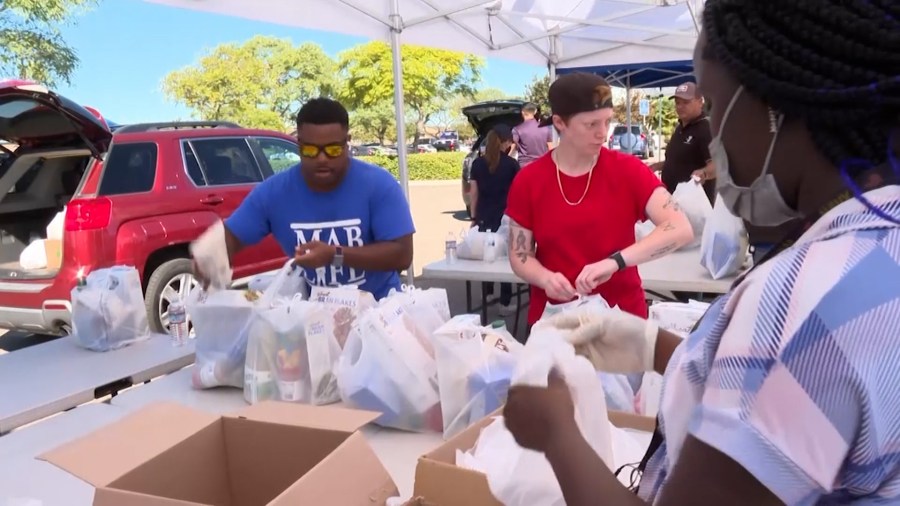The fight to feed America’s food-insecure military members
(NewsNation Now) — Thanksgiving is a time when Americans come together with food, family and friends. But for many people, money is tight and times are hard. It’s forced them to rely on food banks and donations just to put food on the table.
It’s defined as food insecurity, and many Americans are dealing with it, including some you might least expect. Long before the pandemic, and despite a military budget of more than $700 billion, thousands of active-duty military families suffer from food insecurity.
“If we didn’t have family that was able to help, we definitely would have had to stay in our car a few nights,” said Brooklyn Pittman, a military spouse.
Low pay, single-income families, single-parent homes and pandemic job loss are among the many reasons American military families are struggling.
As many as 160,000 active service members have trouble feeding their families, according to Feeding America.

The National Military Family Association surveyed 11,000 military households and found 14% of them had been to a food pantry in the last year.
The problem has become so widespread that military-adjacent organizations such as the Armed Services YMCA and Blue Star Families have set up food banks near major military bases. Feeding America, which coordinates the work of more than 200 food banks across the country, says roughly 30% of troops in the most junior enlisted ranks report facing food insecurity during the previous year.
“It really depends on the time in service,” Navy Petty Officer James Bohanan told NewsNation. “I’ve only been here for five years. The longer you stay in, obviously, the more you get paid. So when you’re just starting out, it’s a lot tougher.”
Eileen Huck, the National Military Family Foundation’s senior director of government relations, said service members can outlast their financial hardship if they’re promoted over time, but still called it “a crisis and something that needs to be addressed.”
One solution is the Supplemental Nutrition Assistance Program, otherwise known as food stamps. But not all military personnel who need the program qualify for it, and the benefits are administered by each state and can vary depending on which one a survice member lives in.

“It’s actually very difficult for military families to access SNAP benefits, because their housing allowances are taken into consideration when calculating eligibility, which puts most military families above the threshold for eligibility for SNAP benefits,” Huck said.
It can be tougher for people who live in expensive areas, since that housing allowance needs to be even bigger, which inflates their income.
As recently as 2019, approximately 42 million Americans were receiving SNAP benefits, according to the US Department of Agriculture. That number includes 22,000 active-duty service members and 213,000 members of the National Guard or reservists. More than 1 million were veterans.
“USDA supports American heroes and aims to make certain our military members and their families have the assistance to meet their nutrition needs,” the department said in a statement. “We are currently reviewing our policy interpretations regarding basic allowance for housing to ensure that we are providing accurate access to SNAP for our dedicated military members and veterans.”
It’s a cause of embarrassment for American leaders as they see the very people we rely on to protect and defend this country struggling to feed themselves and their families.
Last week, Defense Secretary Lloyd Austin announced plans to increase housing payments to many troops and increase ways to combat hunger across the force.
Austin said troops have enough to worry about, and basic necessities including food and housing shouldn’t be among them.
“It’s very few jobs out there where you can say this, but if they’re not fully focused on the job at hand, it can be the difference between mission success or failure,” Dorene Ocamb of the Armed Services YMCA said. “And sometimes even life or death.”
The National Military Family Association is hoping to work with Congress to address the issue that’s preventing military families who need help accessing SNAP benefits.
You can find ways to support them at militaryfamilies.org.















